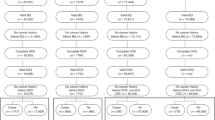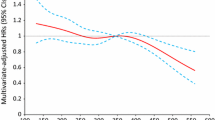Abstract
Background
Total calcium intake appears to reduce occurrence of colorectal adenoma; however, the dose necessary for prevention in young women is unclear. We examined fine categories of calcium intake in relation to occurrence of first colorectal adenoma in a cohort of mostly premenopausal (88 %) women aged 26–60 at time of endoscopy.
Design
We conducted an analysis among 41,403 participants in the Nurses’ Health Study II and assessed intakes of calcium prior to endoscopy through participants’ responses to biannual questionnaires.
Results
Between 1991 and 2007, we documented 2,273 colorectal adenoma cases. There was a significant trend across categories of calcium intakes with lowest intakes suggestive of higher occurrence of adenoma (p = 0.03) and those in the distal colon (p = 0.03) and rectum (p = 0.04). Compared with 1,001–1,250 mg/day of calcium intake, ≤500 mg/day was suggestive of a modest increase in occurrence of adenoma (multivariable RR = 1.21, 95 % CI 0.90–1.61); there were also suggestions of an increased risk with >500 to ≤700 mg/day of calcium. The association between ≤500 mg/day of calcium intake and adenoma was stronger for multiple (RR = 2.27, 95 % CI 1.38, 3.72), large (≥1 cm) (RR = 2.01, 95 % CI 1.27, 3.21), and high-risk adenoma (≥1 cm or mention of villous histology/high-grade dysplasia) (RR = 1.76, 95 % CI 1.13, 2.72). No differences in associations were noted between jointly categorized calcium and phosphorus or magnesium intakes.
Conclusions
Our findings suggest that low intakes of calcium, <500 and possibly 500–700 mg/day, in younger women are associated with an increased risk of multiple and advanced colorectal adenoma.
Similar content being viewed by others
References
Lipkin M (1999) Preclinical and early human studies of calcium and colon cancer prevention. Ann N Y Acad Sci 889:120–127
Gross MD (2005) Vitamin D and calcium in the prevention of prostate and colon cancer: new approaches for the identification of needs. J Nutr 135:326–331
Lamprecht SA, Lipkin M (2003) Chemoprevention of colon cancer by calcium, vitamin D and folate: molecular mechanisms. Nat Rev Cancer 3:601–614
Kim KZ, Shin A, Kim J et al (2013) Association between CASR polymorphisms, calcium intake, and colorectal cancer risk. PLoS ONE 8:e59628
Bergsma-Kadijk JA, van ‘t Veer P, Kampman E, Burema J (1996) Calcium does not protect against colorectal neoplasia. Epidemiology 7:590–597
Martinez ME, Willett WC (1998) Calcium, vitamin D, and colorectal cancer: a review of the epidemiologic evidence. Cancer Epidemiol Biomarkers Prev 7:163–168
Cho E, Smith-Warner SA, Spiegelman D et al (2004) Dairy foods, calcium, and colorectal cancer: a pooled analysis of 10 cohort studies. J Natl Cancer Inst 96:1015–1022
Flood A, Peters U, Chatterjee N, Lacey JV Jr, Schairer C, Schatzkin A (2005) Calcium from diet and supplements is associated with reduced risk of colorectal cancer in a prospective cohort of women. Cancer Epidemiol Biomarkers Prev 14:126–132
Kesse E, Boutron-Ruault MC, Norat T, Riboli E, Clavel-Chapelon F (2005) Dietary calcium, phosphorus, vitamin D, dairy products and the risk of colorectal adenoma and cancer among French women of the E3 N-EPIC prospective study. Int J Cancer 117:137–144
Peters U, Chatterjee N, McGlynn KA et al (2004) Calcium intake and colorectal adenoma in a US colorectal cancer early detection program. Am J Clin Nutr 80:1358–1365
Wu K, Willett WC, Fuchs CS, Colditz GA, Giovannucci EL (2002) Calcium intake and risk of colon cancer in women and men. J Natl Cancer Inst 94:437–446
Baron JA, Beach M, Mandel JS et al (1999) Calcium supplements for the prevention of colorectal adenomas. Calcium polyp prevention study group. N Engl J Med 340:101–107
Shaukat A, Scouras N, Schunemann HJ (2005) Role of supplemental calcium in the recurrence of colorectal adenomas: a metaanalysis of randomized controlled trials. Am J Gastroenterol 100:390–394
Wallace K, Baron JA, Cole BF et al (2004) Effect of calcium supplementation on the risk of large bowel polyps. J Natl Cancer Inst 96:921–925
Hofstad B, Vatn M, Hoff G, Larsen S, Osnes M (1992) Growth of colorectal polyps: design of a prospective, randomized, placebo-controlled intervention study in patients with colorectal polyps. Eur J Cancer Prev 1:415–422
Faivre J, Doyon F, Boutron MC (1991) The ECP calcium fibre polyp prevention study. The ECP Colon Group. Eur J Cancer Prev 1(Suppl 2):83–89
Oh K, Willett WC, Wu K, Fuchs CS, Giovannucci EL (2007) Calcium and vitamin D intakes in relation to risk of distal colorectal adenoma in women. Am J Epidemiol 165:1178–1186
Gallagher JC, Rapuri PB, Haynatzki G, Detter JR (2002) Effect of discontinuation of estrogen, calcitriol, and the combination of both on bone density and bone markers. J Clin Endocrinol Metab 87:4914–4923
Nordin BE, WIshart JM, Clifton PM et al (2004) A longitudinal study of bone-related biochemical changes at the menopause. Clin Endocrinol (Oxf) 61:123–130
Kearney J, Giovannucci E, Rimm EB et al (1996) Calcium, vitamin D, and dairy foods and the occurrence of colon cancer in men. Am J Epidemiol 143:907–917
Newmark HL, Lipkin M (1992) Calcium, vitamin D, and colon cancer. Cancer Res 52:2067s–2070s
Koshihara M, Katsumata S, Uehara M, Suzuki K (2005) Effects of dietary phosphorus intake on bone mineralization and calcium absorption in adult female rats. Biosci Biotechnol Biochem 69:1025–1028
Newmark HL, Wargovich MJ, Bruce WR (1984) Colon cancer and dietary fat, phosphate, and calcium: a hypothesis. J Natl Cancer Inst 72:1323–1325
Hardwick LL, Jones MR, Brautbar N, Lee DB (1991) Magnesium absorption: mechanisms and the influence of vitamin D, calcium and phosphate. J Nutr 121:13–23
Iseri LT, French JH (1984) Magnesium: nature’s physiologic calcium blocker. Am Heart J 108:188–193
McCullough ML, Robertson AS, Rodriguez C et al (2003) Calcium, vitamin D, dairy products, and risk of colorectal cancer in the cancer prevention study II nutrition cohort (United States). Cancer Causes Control 14:1–12
Abrams SA, Grusak MA, Stuff J, O’Brien KO (1997) Calcium and magnesium balance in 9-14-y-old children. Am J Clin Nutr 66:1172–1177
Dai Q, Shrubsole MJ, Ness RM et al (2007) The relation of magnesium and calcium intakes and a genetic polymorphism in the magnesium transporter to colorectal neoplasia risk. Am J Clin Nutr 86:743–751
Kampman E, Giovannucci E, van ‘t Veer P et al (1994) Calcium, vitamin D, dairy foods, and the occurrence of colorectal adenomas among men and women in two prospective studies. Am J Epidemiol 139:16–29
Aloia JF, Chen DG, Yeh JK, Chen H (2010) Serum vitamin D metabolites and intestinal calcium absorption efficiency in women. Am J Clin Nutr 92:835–840
Giovannucci E, Stampfer MJ, Colditz GA et al (1993) Folate, methionine, and alcohol intake and risk of colorectal adenoma. J Natl Cancer Inst 85:875–884
Willett WCSM (1998) Nutritional epidemiology. Oxford University Press, New York
Salvini S, Hunter DJ, Sampson L et al (1989) Food-based validation of a dietary questionnaire: the effects of week-to-week variation in food consumption. Int J Epidemiol 18:858–867
Willett WC, Sampson L, Stampfer MJ et al (1985) Reproducibility and validity of a semiquantitative food frequency questionnaire. Am J Epidemiol 122:51–65
Willett WC, Sampson L, Browne ML et al (1988) The use of a self-administered questionnaire to assess diet four years in the past. Am J Epidemiol 127:188–199
Ascherio A, Hennekens C, Willett WC et al (1996) Prospective study of nutritional factors, blood pressure, and hypertension among US women. Hypertension 27:1065–1072
Scotto J, Cotton G, Urbach F, Berger D, Fears T (1988) Biologically effective ultraviolet radiation: surface measurements in the United States, 1974 to 1985. Science 239:762–764
Alberts DS, Ritenbaugh C, Story JA et al (1996) Randomized, double-blinded, placebo-controlled study of effect of wheat bran fiber and calcium on fecal bile acids in patients with resected adenomatous colon polyps. J Natl Cancer Inst 88:81–92
Miller EA, Keku TO, Satia JA, Martin CF, Galanko JA, Sandler RS (2005) Calcium, vitamin D, and apoptosis in the rectal epithelium. Cancer Epidemiol Biomarkers Prev 14:525–528
Rozen P, Lubin F, Papo N et al (2001) Calcium supplements interact significantly with long-term diet while suppressing rectal epithelial proliferation of adenoma patients. Cancer 91:833–840
Wargovich MJ, Isbell G, Shabot M et al (1992) Calcium supplementation decreases rectal epithelial cell proliferation in subjects with sporadic adenoma. Gastroenterology 103:92–97
Bonithon-Kopp C, Kronborg O, Giacosa A, Rath U, Faivre J (2000) Calcium and fibre supplementation in prevention of colorectal adenoma recurrence: a randomised intervention trial. European Cancer Prevention Organisation Study Group. Lancet 356:1300–1306
Ervin RB, Wang CY, Wright JD, Kennedy-Stephenson J (2004) Dietary intake of selected minerals for the United States population: 1999-2000. Adv Data 1(5):6
McMichael AJ, Potter JD (1985) Host factors in carcinogenesis: certain bile-acid metabolic profiles that selectively increase the risk of proximal colon cancer. J Natl Cancer Inst 75:185–191
Kampman E, Slattery ML, Caan B, Potter JD (2000) Calcium, vitamin D, sunshine exposure, dairy products and colon cancer risk (United States). Cancer Causes Control 11:459–466
Peters RK, Pike MC, Garabrant D, Mack TM (1992) Diet and colon cancer in Los Angeles County, California. Cancer Causes Control 3:457–473
Stemmermann GN, Nomura A, Chyou PH (1990) The influence of dairy and nondairy calcium on subsite large-bowel cancer risk. Dis Colon Rectum 33:190–194
Wu K, Willett WC, Fuchs CS, Colditz GA, Giovannucci EL (2002) Calcium intake and risk of colon cancer in women and men. J Natl Cancer Inst 94:437–446
Benito E, Cabeza E, Moreno V, Obrador A, Bosch FX (1993) Diet and colorectal adenomas: a case-control study in Majorca. Int J Cancer 55:213–219
Macquart-Moulin G, Riboli E, Cornee J, Kaaks R, Berthezene P (1987) Colorectal polyps and diet: a case-control study in Marseilles. Int J Cancer 40:179–188
Acknowledgments
We would like to thank the participants and staff of the Nurses’ Health Study II for their valuable contributions as well as the following state cancer registries for their help: AL, AZ, AR, CA, CO, CT, DE, FL, GA, ID, IL, IN, IA, KY, LA, ME, MD, MA, MI, NE, NH, NJ, NY, NC, ND, OH, OK, OR, PA, RI, SC, TN, TX, VA, WA, WY. In addition, this study was approved by the Connecticut Department of Public Health (DPH) Human Investigations Committee. Certain data used in this publication were obtained from the DPH. The authors assume full responsibility for analyses and interpretation of these data. This work was supported by research grant R01 CA55075/CA136950, R02 CA125837/CA 151993 from the National Institutes of Health. Our paper is the first to examine a dose–response relationship between calcium intake and risk colorectal adenoma in a group of largely premenopausal women who have estrogen to assist in calcium absorption. Knowing the lowest dose of calcium required to reduce risk of the precursors to colorectal cancer is important because higher intakes of dairy increases may increase risk of other unhealthy outcomes. Calcium intake is easily modifiable and can have an important public health message.
Author information
Authors and Affiliations
Corresponding author
Additional information
Kana Wu and Edward L. Giovannucci are co-senior authors.
Rights and permissions
About this article
Cite this article
Massa, J., Cho, E., Orav, E.J. et al. Total calcium intake and colorectal adenoma in young women. Cancer Causes Control 25, 451–460 (2014). https://doi.org/10.1007/s10552-014-0347-9
Received:
Accepted:
Published:
Issue Date:
DOI: https://doi.org/10.1007/s10552-014-0347-9




